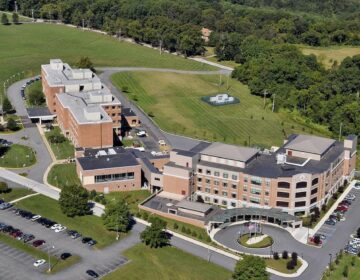Only statewide question on ballot: Yea/nay on tax break for veterans
Measure would benefit aging veterans who now lose $250 property-tax deduction when they move to a retirement community.

Currently, about 180,000 veterans and their widows or widowers get a $250 veterans’ tax break each year in NJ. (Corey Templeton/Flicrk)
This article originally appeared on NJ Spotlight.
–
In the only statewide question on the Nov. 5 ballot, New Jersey voters are being asked to approve a small tax break for a few thousand veterans and their spouses, at a total cost of less than $1 million a year.
That combination should be a slam dunk, particularly given the subject matter and voters’ record of approving 90% of the 30 questions put before them over the last 20 years. Still, it’s unclear what may happen when there is little public awareness of the issue in a low-turnout election.
The question asks whether veterans who served during a time of war or other emergency and now live in a continuing care retirement community should get the same $250 annual property-tax deduction that veterans who own their own home receive. People living in one of the state’s 25 CCRCs, which provide housing options ranging from a traditional unit to assisted living and long-term care, do not pay property taxes individually but do so through their monthly fees to the community.
Lawmakers first wrote a property-tax break for veterans into the new constitution of 1947, approved shortly after World War II ended. A 1963 amendment created a specific $50 deduction and in 1999 voters agreed to bump that to $250. Other amendments have extended deductions to veterans living in housing cooperatives and to their widows.
Because the deduction is enshrined in the constitution, any changes, however minimal, must be approved by voters.
The nonpartisan Office of Legislative Services has estimated the cost of extending the deduction to veterans in CCRCs at between $350,000 and $550,000 a year. Municipalities would be reimbursed by Trenton for 102% of the cost, as they are with all tax deductions for veterans.
If voters approve the change, a law signed by Lt. Gov. Sheila Oliver last August will have the state pay the CCRCs $250 for each eligible veteran, which the communities will pass directly to the veterans to offset the portion of their monthly fees that goes for property taxes.
Advocate: a matter of fairness
Gary Baldwin, a retired Air Force officer who spent 26 years in the military, has been fighting for this change for 18 years, saying that it is not fair to take the small tax benefit away from a veteran who moves to a CCRC, possibly because he is no longer able to properly care for a single-family home and property. Baldwin learned about the lost deduction when he sold his own home and moved to the Seabrook Retirement Community in Tinton Falls. He estimated the change if approved, would benefit nearly 3,000 veterans and spouses.
“We are getting a lot of people excited about it,” said Baldwin, who is in his 80s. “We think it is going really well. I have not heard anything other than it will pass.”
While no group has formed against the question, there has been some opposition voiced on NJ 101.5 talk radio. Bill Spadea, who hosts the morning drive-time show, penned an opinion piece on the station’s website urging people to vote down the deduction. “There is no reason for this to pass and further increase the cost of doing business in New Jersey,” he wrote.
Contrary to what’s in the opinion piece, the CCRCs would not be required to cover the cost of the deduction. That would be paid for by the state out of the property-tax relief fund. And while the veterans may not technically pay their own property taxes once they move to a CCRC, the deduction would only be paid to those living in a community whose agreement requires an individual to pay through fees a share of the property taxes paid by the CCRC.
Both the constitutional amendment (SCR-110) and enabling legislation passed the Legislature with no opposition.
“Our veterans have done so much for us, it is simply the least we can do to give them the same assistance we give to current homeowners,” said Assemblyman Eric Houghtaling (D-Monmouth), one of the sponsors of the bill, when Oliver signed it. “The goal of this law is to make a simple fix to offer all of our veterans the same benefit whether they own a home or live in a continuing care retirement community.”
Another sponsor, Sen. Fred Madden (D-Gloucester), said that “while $250 may not seem like a large sum, when someone is in a retirement community, often living on a fixed income, every dollar counts.”
Getting out the vote
With no budget, proponents have mostly focused their efforts to rally support directly with residents of the communities and the Organization of Resident Associations of New Jersey, which represents those who live in the CCRCs.
“We’re getting them all to organize get out the vote efforts,” Baldwin said.
Baldwin, the council president in Tinton Falls, also got his colleagues to pass a supporting resolution and sent that to other municipal governing bodies throughout the state. He said he has started hearing from elected officials elsewhere who are similarly supporting the question.
Voters have approved 27 of 30 public questions put before them over the last 20 years. The last one to fail was a 2016 question that sought to expand casino gambling beyond Atlantic City.
Still, the outcome is not certain. Lawmakers expressly held back on putting other questions — most notably one legalizing recreational marijuana — on the ballot because turnout is expected to be very low with state Assembly seats topping the ticket on Nov. 5. In 2015, the last time seats in the lower house were the highest office on the ballot, just 22% of those registered voted.
In total, about 180,000 veterans and their widows or widowers get a $250 veterans’ tax break each year, according to data compiled by the state Department of Community Affairs. The state also provides a property-tax exemption to veteran homeowners who were totally disabled during a war or other conflict, but only about 10,000 receive that benefit. CCRC residents would be eligible only for the $250 deduction.
WHYY is your source for fact-based, in-depth journalism and information. As a nonprofit organization, we rely on financial support from readers like you. Please give today.




